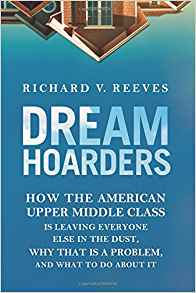You have /5 articles left.
Sign up for a free account or log in.
Dream Hoarders: How the American Upper Middle Class Is Leaving Everyone Else in the Dust, Why That Is a Problem, and What to Do About It by Richard V. Reeves.
 Published in October of 2017.
Published in October of 2017.
Higher education people don’t agree on much. We have passionate arguments about everything from the proper role of technology in learning to how we might treat our (perhaps?) self-inflicted cost disease.
While the internal academic conversation may be contentious, our orientation to the external world is more unified. We present higher education as society’s primary engine of opportunity. If we believe in anything as a community, it is our belief in the power of higher education to provide economic options. We view our work in higher education as a counterweight to the forces that are driving inequality.
Then a book like Dream Hoarders comes around, and we are forced to examine some of our own most closely held assumptions. In Dream Hoarders, Brookings senior fellow Richard Reeves argues that rather than being part of the solution to reducing economic inequality, higher education is in reality part of the problem.
Our Inside Higher Ed community has already engaged in a good discussion of Dream Hoarders. Largely, I suspect, those of us who benefit most from the status quo postsecondary tax and admissions policies are likely to reject the arguments in Dream Hoarders. Your objections may even cause you to decide not to invest your time in reading the book.
My goal here is not to synthesize all the arguments in Dream Hoarders - as Reeves as much to say in this concise and fluidly written book about much else besides higher ed - but to persuade you that Dream Hoarders is worth your paying the opportunity cost to read it. You will have to let us know if you are convinced.
While there is much to disagree with in Dream Hoarders - and I disagree with most of what Reeves argues - I do believe that we need to come up with a stronger arguments for the practices and policies in which higher ed depends.
Particularly now, we will need to make more convincing arguments for the societal benefits of protecting university endowments. It seems that 529 plans are safe (for now), but that policies that have encouraged the long-term sustainability of our premier educational institutions are under attack.
Can we have a full throated defense of the endowments that enable an affordable education to working families at top institutions, as well as the support of basic research, while at the same time defending some of the other practices that Reeves finds so objectionable? Among these policies are that of legacy admissions preferences, and the increasing reliance of early decision admissions, practices that Reeves believes benefit mostly the wealthy.
My first instinct is to defend higher education against every attack. After all, it seems that arguing for any policy that weakens the resilience of our colleges and universities is a bad idea. What Dream Hoarders provides, however, is a well-reasoned and evidence-based critique.
This is not say that Reeves is persuasive - at least I was not persuaded. Rather, a book like Dream Hoarders lays down a challenge that we would be wise to take up.
We should be confident enough in the societal value of higher education to give our critics a fair hearing.
What are you reading?




